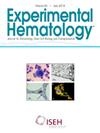Ex vivo modelling reveals low levels of CKS1 inhibition boost haematopoiesis via AKT/Foxo1 signalling
IF 2.1
4区 医学
Q2 HEMATOLOGY
引用次数: 0
Abstract
Hematopoietic stem cells (HSCs) are rare cells residing at the top of the haematopoietic hierarchy capable of reconstituting all blood cell populations through their ability of self-renewal and differentiation. Their ability to maintain haematopoiesis can be majorly depleted by chemotherapeutic agents, leading to a long-term bone marrow injury. However, pre-clinical studies have focused on the acute effects of chemotherapy, leaving the lasting impact on healthy cells poorly understood. To study this, we combined rapid ex vivo models to study the long-term/late-stage effects of a cyclin-dependent kinase subunit 1 (CKS1) inhibitor. Inhibition of CKS1 has been shown to protect healthy HSCs from chemotherapy during acute myeloid leukaemia, and here we show a dose-dependent role of long-term CKS1 inhibition on haematopoiesis, either boosting B lymphopoiesis or ablating HSC proliferation capacity, dependent on the context. Mechanistically, low doses of the CKS1 inhibitor (CKS1i) affects AKT-Foxo1 signalling potentiating B-cell differentiation, but impairing HSC proliferation. These results reveal a novel role for CKS1 in boosting B lymphopoiesis and propose the use of rapid ex vivo models to investigate the long-term effects of chemotherapeutic treatments targeting HSCs with the potential of reducing late adverse effects.

体外模型显示,低水平的CKS1抑制通过AKT/Foxo1信号传导促进造血。
造血干细胞(Hematopoietic stem cells, hsc)是一种罕见的细胞,位于造血系统的顶层,能够通过自我更新和分化的能力重建所有的血细胞群。它们维持造血的能力可能主要被化疗药物耗尽,导致长期的骨髓损伤。然而,临床前研究主要集中在化疗的急性效应上,对健康细胞的持久影响知之甚少。为了研究这一点,我们结合了快速离体模型来研究周期蛋白依赖性激酶亚单位1 (CKS1)抑制剂的长期/晚期效应。在急性髓性白血病期间,CKS1抑制已被证明可以保护健康的HSC免受化疗的影响,在这里,我们显示了CKS1抑制对造血的剂量依赖性作用,根据具体情况,要么促进B淋巴细胞的生成,要么削弱HSC的增殖能力。从机制上讲,低剂量的CKS1抑制剂(CKS1i)激活Foxo1信号,增强b细胞分化,但损害HSC增殖。这些结果揭示了SCF-CKS1复合物在促进造血中的新作用,并建议使用快速离体模型来研究针对hsc的化疗治疗的长期效果,并具有减少晚期不良反应的潜力。
本文章由计算机程序翻译,如有差异,请以英文原文为准。
求助全文
约1分钟内获得全文
求助全文
来源期刊

Experimental hematology
医学-血液学
CiteScore
5.30
自引率
0.00%
发文量
84
审稿时长
58 days
期刊介绍:
Experimental Hematology publishes new findings, methodologies, reviews and perspectives in all areas of hematology and immune cell formation on a monthly basis that may include Special Issues on particular topics of current interest. The overall goal is to report new insights into how normal blood cells are produced, how their production is normally regulated, mechanisms that contribute to hematological diseases and new approaches to their treatment. Specific topics may include relevant developmental and aging processes, stem cell biology, analyses of intrinsic and extrinsic regulatory mechanisms, in vitro behavior of primary cells, clonal tracking, molecular and omics analyses, metabolism, epigenetics, bioengineering approaches, studies in model organisms, novel clinical observations, transplantation biology and new therapeutic avenues.
 求助内容:
求助内容: 应助结果提醒方式:
应助结果提醒方式:


